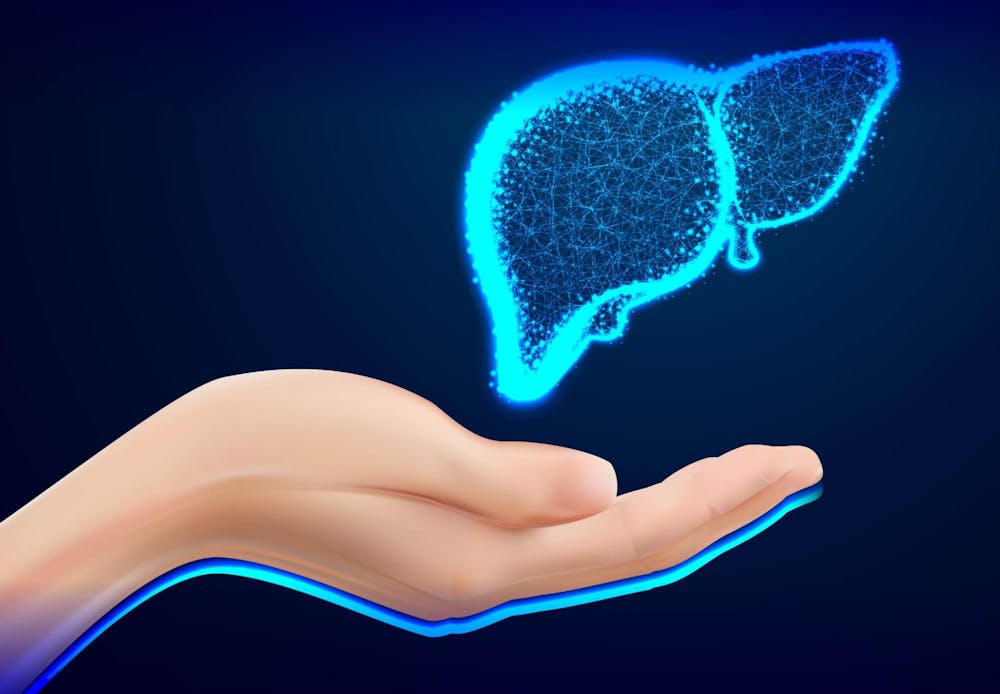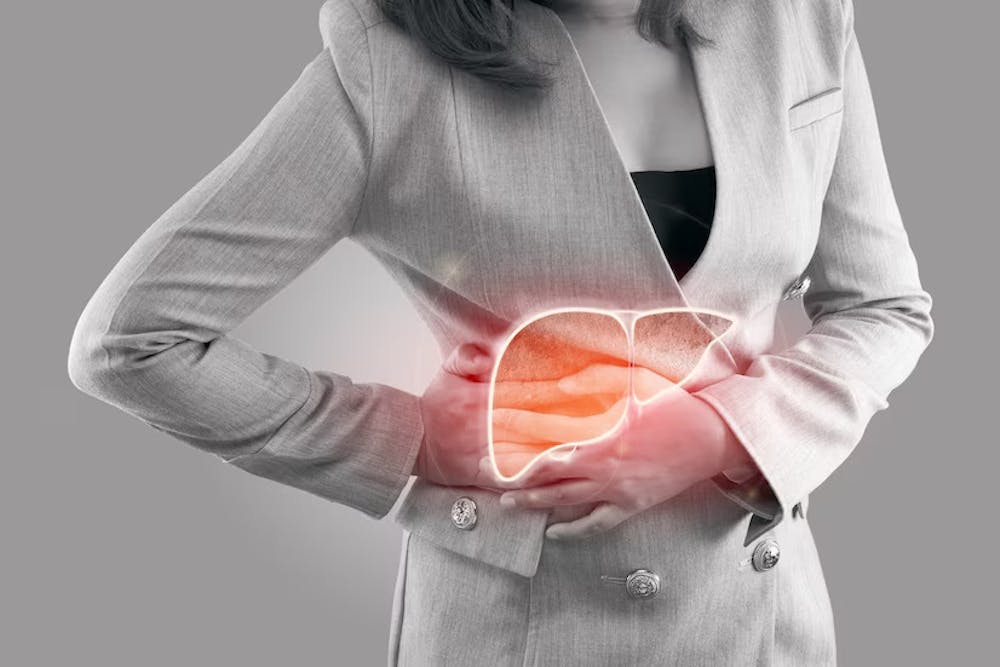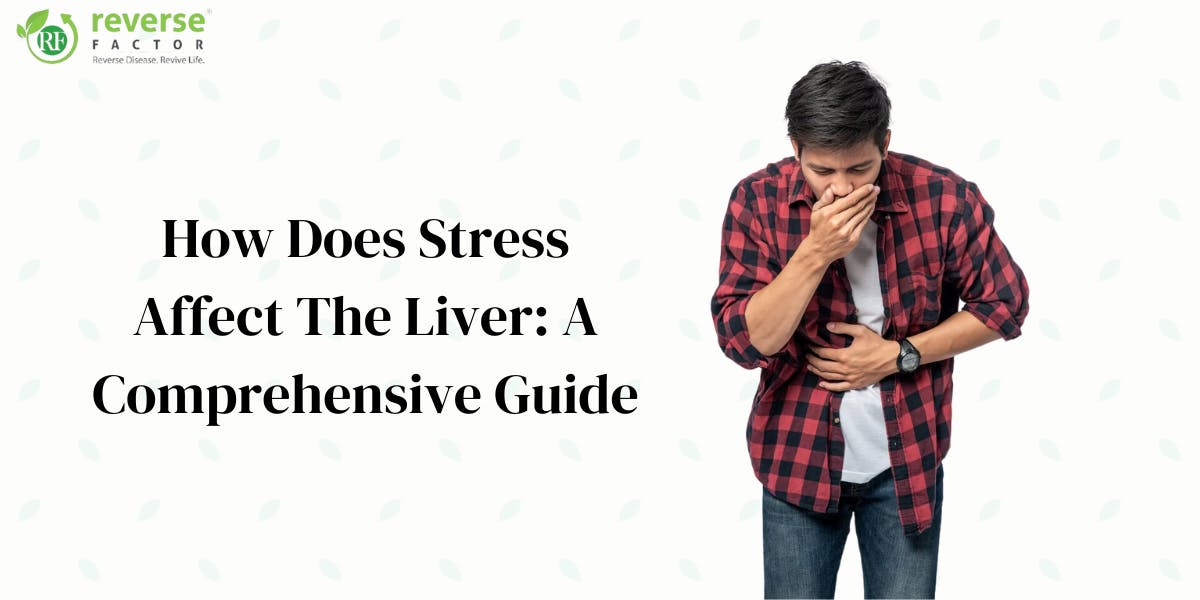Although stress is a common part of our lives, did you know that it can have a significant impact on the health of your liver? The liver is one of the most important organs in the body which filters pollutants, breaks down nutrients, and controls metabolism. Unfortunately, when stress levels rise too high, the liver becomes inflamed. The liver loses its ability to function, which causes symptoms of liver damage. People suffering from fatty liver symptoms often opt for the best fatty liver disease reversal program. This health program can help you to reverse your liver condition naturally.

This in-depth guide will cover how does stress affect the liver, the symptoms of stress problems, and tips to manage stress. So continue reading if you're ready to discover how to safeguard one of your body's most vital organs!
Recommended: Understanding The Connection Between Fatty Liver Disease And Diabetes
What Exactly Is Stress?
We all experience stress at some point in our life, but what is it exactly? Stress, whether it is physical or emotional, is a biological reaction to a perceived threat or challenge. Stress triggers our body's "fight or flight" reaction, which releases a group of hormones like cortisol and adrenaline. These hormones prepare us to respond to the situation at hand. While this reaction may be beneficial in short bursts, ongoing stress can harm our mental and physical health. It increases the risk of conditions like anxiety, depression, heart disease, and diabetes. If you are suffering from diabetes, the best diabetes reversal program in India can help you reverse your condition naturally.

Must Read: The Secret to Healing Gut Health and Preventing Disease
Link Between Stress And Liver Health
The link between stress and liver health is not always obvious, but it is important. According to research, stress can damage liver function and causes symptoms of liver cirrhosis and other liver issues. Stress causes our bodies to create large amounts of stress hormones like cortisol. Cortisol can cause inflammation and oxidative stress in the liver. It further damages liver cells. Our liver may be permanently harmed as a result of this damage, which could affect its ability to filter toxins and carry out other essential tasks. Hence, it's crucial to take steps to manage the signs of liver stress and start consuming a fatty liver reversal diet.
See More: India's Top 13 Fatty Liver Home Remedies That Work Fast
Signs And Symptoms Of Stress
The following are the symptoms of stress on the body -
- Increased heart rate and blood pressure
- Shortness of breath
- Muscle tension or pain
- Headaches or migraines
- Difficulty sleeping
- Changes in appetite
- Digestive issues, like nausea, constipation, or diarrhea
- Feeling irritable, anxious, or overwhelmed
- Difficulty concentrating
- Changes in mood or behavior
- Increased use of alcohol, and tobacco
Signs Of Liver Problems
Listed below are some common signs of liver issues-

How To Manage Stress For Better Liver Health?
Meditation
Meditation is one of the best forms of relaxation that requires concentrating your mind and body to create a sense of calm and peace. It can reduce stress by lowering the body's production of stress hormones. These hormones have the potential to harm the liver and inflame it when stress levels are high. Meditation helps you to make your liver healthy and also boost your immune system.
Exercise
Regular physical activity benefits not only your physical health but also your liver and mental well-being. Exercise helps to lower stress levels by releasing endorphins. Exercise can lower inflammation, improves blood flow to the liver, and help in blood sugar regulation. It may also help with weight loss, which can reduce the risk of developing nonalcoholic fatty liver disease symptoms.
Deep Breathing
Deep breathing is a simple yet powerful practice that can help lower stress and improve liver health. Taking deep breaths can activate your parasympathetic nervous system. It helps to relax the body and reduce feelings of tension and anxiety. Deep breathing can also increase blood flow and oxygenation, which is good for liver health.
Foods To Avoid
Did you know that your liver health and stress levels can be significantly impacted by the foods you consume? You should avoid few items to reduce stress and promote a healthy liver. Fried foods, sugary drinks, and highly processed foods are all unhealthy food items that can cause signs of liver damage and inflammation. Excessive alcohol consumption and high levels of caffeine can also put a strain on your liver and worsen stress levels.
Foods To Eat
You can add plant-based foods to your diet that can have a significant impact on your ability to manage stress and promote liver function. Antioxidant-rich foods including leafy greens and cruciferous vegetables can help you in reducing inflammation. You can include healthy fats like those in nuts, and seeds can also help the liver and reduce stress. Consuming herbs and spices like garlic, ginger, and turmeric may also help with stress reduction and support liver health.
Sleep
To reduce stress and support a healthy liver, it's crucial to get adequate sleep. The body repairs and regenerates tissues when we sleep, which is essential for detoxification. Lack of sleep can result in a variety of health problems, including a high level of stress and impaired liver function. Therefore, you must aim for 7-9 hours of sleep each night to improve your health and well-being. You must maintain a regular sleep schedule, and avoid the consumption of caffeine and alcohol before bed.
Final Thought –
Stress can damage your liver and affect everything from detoxification to inflammation. Hence, it’s crucial to identify the signs of fatty liver and symptoms of stress. You should start practicing deep breathing and mindfulness meditation. Good sleep hygiene and liver-healthy foods are a must to stay fit and healthy. Even though stress is an inevitable part of our lives, there are many things you can do to reduce its negative effects on your body and mind. Keep in mind that managing your stress and taking care of your liver is a long journey, but they will pay off in the form of a healthier and happier you.
Frequently Asked Questions –
What Are The Symptoms Of A Stressed Liver?
The main symptoms of a stressed liver may include fatigue, digestive issues, weight gain, mood changes, and skin problems.
How Do You Heal A Stressed Liver?
To heal a stressed liver, it's important to manage stress levels, follow a healthy diet, exercise regularly, and avoid alcohol.
Can Emotional Stress Cause Fatty Liver?
Yes, emotional stress can result in a fatty liver by raising cortisol levels. It is a hormone that can cause insulin resistance and the buildup of fat in the liver.
Can Stress Cause Elevated Liver Enzymes?
Yes, stress can increase liver enzymes because it releases stress hormones like cortisol. It can harm liver cells and cause inflammation.
Can Stress Cause Liver Problems?
Yes, stress can damage the liver by causing more inflammation, reducing liver function. It can raise the risk of developing liver disease.
Can Stress Cause Liver Pain?
Yes, in some cases stress can result in liver pain. But liver pain is more frequently linked to injuries, infections, and diseases of the liver.
What Foods Are Good For The Liver During Times Of Stress?
Foods that are rich in antioxidants, fiber, and healthy fats, such as fruits, vegetables, whole grains, nuts, and fatty fish, are helpful for the liver.
Can Exercise Help To Reduce Stress And Support Liver Health?
Exercise can help to lower stress and support liver health by promoting relaxation, and reducing inflammation.
What Are The Signs And Symptoms Of Fatty Liver?
Fatigue, stomach pain, an enlarged liver, and high liver enzyme levels in blood tests are all indicators of fatty liver.
What Are The Signs Of Stress At Work?
Trouble concentrating, or suffering from headaches or muscle strain are signs of workplace stress.




